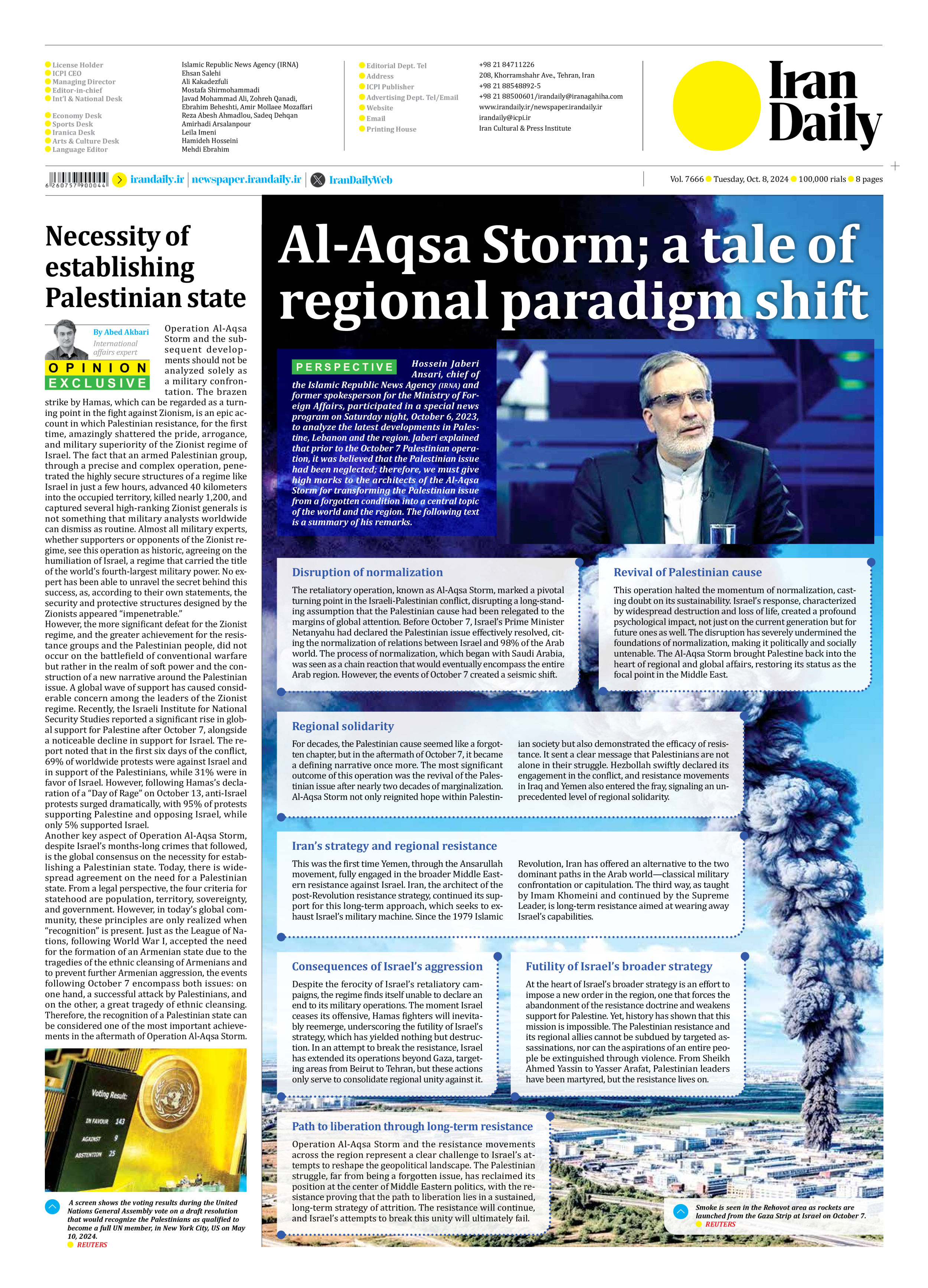
Al-Aqsa Storm; a tale of regional paradigm shift
Hossein Jaberi Ansari, chief of the Islamic Republic News Agency (IRNA) and former spokesperson for the Ministry of Foreign Affairs, participated in a special news program on Saturday night, October 6, 2023, to analyze the latest developments in Palestine, Lebanon and the region. Jaberi explained that prior to the October 7 Palestinian operation, it was believed that the Palestinian issue had been neglected; therefore, we must give high marks to the architects of the Al-Aqsa Storm for transforming the Palestinian issue from a forgotten condition into a central topic of the world and the region. The following text is a summary of his remarks.
Disruption of normalization
The retaliatory operation, known as Al-Aqsa Storm, marked a pivotal turning point in the Israeli-Palestinian conflict, disrupting a long-standing assumption that the Palestinian cause had been relegated to the margins of global attention. Before October 7, Israel’s Prime Minister Netanyahu had declared the Palestinian issue effectively resolved, citing the normalization of relations between Israel and 98% of the Arab world. The process of normalization, which began with Saudi Arabia, was seen as a chain reaction that would eventually encompass the entire Arab region. However, the events of October 7 created a seismic shift.
Revival of Palestinian cause
This operation halted the momentum of normalization, casting doubt on its sustainability. Israel’s response, characterized by widespread destruction and loss of life, created a profound psychological impact, not just on the current generation but for future ones as well. The disruption has severely undermined the foundations of normalization, making it politically and socially untenable. The Al-Aqsa Storm brought Palestine back into the heart of regional and global affairs, restoring its status as the focal point in the Middle East.
Regional solidarity
For decades, the Palestinian cause seemed like a forgotten chapter, but in the aftermath of October 7, it became a defining narrative once more. The most significant outcome of this operation was the revival of the Palestinian issue after nearly two decades of marginalization. Al-Aqsa Storm not only reignited hope within Palestinian society but also demonstrated the efficacy of resistance. It sent a clear message that Palestinians are not alone in their struggle. Hezbollah swiftly declared its engagement in the conflict, and resistance movements in Iraq and Yemen also entered the fray, signaling an unprecedented level of regional solidarity.
Iran’s strategy and regional resistance
This was the first time Yemen, through the Ansarullah movement, fully engaged in the broader Middle Eastern resistance against Israel. Iran, the architect of the post-Revolution resistance strategy, continued its support for this long-term approach, which seeks to exhaust Israel’s military machine. Since the 1979 Islamic Revolution, Iran has offered an alternative to the two dominant paths in the Arab world—classical military confrontation or capitulation. The third way, as taught by Imam Khomeini and continued by the Supreme Leader, is long-term resistance aimed at wearing away Israel’s capabilities.
Consequences of Israel’s aggression
Despite the ferocity of Israel’s retaliatory campaigns, the regime finds itself unable to declare an end to its military operations. The moment Israel ceases its offensive, Hamas fighters will inevitably reemerge, underscoring the futility of Israel’s strategy, which has yielded nothing but destruction. In an attempt to break the resistance, Israel has extended its operations beyond Gaza, targeting areas from Beirut to Tehran, but these actions only serve to consolidate regional unity against it.
Futility of Israel’s broader strategy
At the heart of Israel’s broader strategy is an effort to impose a new order in the region, one that forces the abandonment of the resistance doctrine and weakens support for Palestine. Yet, history has shown that this mission is impossible. The Palestinian resistance and its regional allies cannot be subdued by targeted assassinations, nor can the aspirations of an entire people be extinguished through violence. From Sheikh Ahmed Yassin to Yasser Arafat, Palestinian leaders have been martyred, but the resistance lives on.
Path to liberation through long-term resistance
Operation Al-Aqsa Storm and the resistance movements across the region represent a clear challenge to Israel’s attempts to reshape the geopolitical landscape. The Palestinian struggle, far from being a forgotten issue, has reclaimed its position at the center of Middle Eastern politics, with the resistance proving that the path to liberation lies in a sustained, long-term strategy of attrition. The resistance will continue, and Israel’s attempts to break this unity will ultimately fail.







